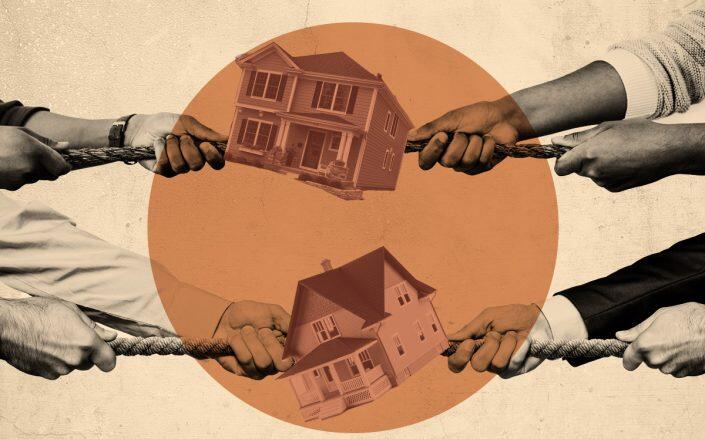Do you want to stand out from the pack of mediocrity by having a ton of deals under your belt and being one of the top 10 realtors in the business?
Closing a deal is one of the realtor’s most challenging tasks, and unfortunately, a large number of realtors have only received training in the administrative aspects of real estate and have no knowledge of the strategies and techniques needed to clinch a deal.
This is absolutely critical because, at the end of the day, selling is what matters in real estate; without it, there is no money to be made.
However, for someone who has successfully marketed a house and generated leads that eventually turned into prospects, there is only one thing left to do to ensure the transaction is finalized when offers start rolling in, and that is effective negotiation.
In this article, we’ll be giving you the best real estate negotiation strategies for realtors. Let’s dive in and find out how to negotiate and close deals like a pro.
1. Conduct your research
As a realtor, you should gain as much knowledge as possible before buying or selling a home. To be prepared to negotiate with the other party, you need to thoroughly research the area and be up-to-date on market conditions.
You should always have information about the property, the neighborhood, and the real estate market at your fingertips because it will give you more leverage when making an offer or considering an offer.
Apart from researching the property, neighborhood, and market value, you should investigate the other real estate agent you’re negotiating with to learn their stance during their previous negotiations and at what level they often concede. This can be accomplished by monitoring their prior transactions to determine the difference between their selling price and the original listed price.
Knowing this would inform you of the approach to take while negotiating to emerge victorious.
2. Understand the other party’s needs
Rushing into a negotiation without getting to know the other side will put you at a great disadvantage. Any real estate transaction will be won by the party with the most information since the more you know about the seller or buyer, the better you will be able to comprehend their purpose and utilize it to your advantage.
If you learn, for instance, that the buyer adores luxury, you may continue to cite the opulent features of your home as the justification for your pricing. This would appeal to them as it is what they are interested in, and they would, in turn, be willing to pay a larger sum to acquire the property.
Additionally, if you are the buyer’s realtor, understanding the seller’s motivation and needs will assist you in negotiating successfully on your client’s behalf.
For instance, if the seller is in trouble and has to sell the property quickly, this would indicate that the seller’s main concern is not price but rather timing, and as a result, you can appeal to the seller’s need by reiterating how capable you are to acquire the house as quickly as possible.
3. Avoid showing desperation
Being desperate is a bad technique, and you don’t have to be an expert in real estate negotiation to understand that. Making important decisions when you’re feeling emotional is never a good idea, and this is especially true when you’re negotiating real estate contracts.
As a selling agent, it is advisable to avoid displaying how eager you are to sell a property because the opposing party can use it as a rationale to underprice the home.
You should set a limit and control your emotions no matter how much you love the property to prevent getting misled into paying more than you bargained for.
4. Make them think saying yes is their idea
A successful negotiation requires making the person on the other side of the table feel at ease at all times. This is done by having them believe that agreeing to the terms was their idea.
No one likes to feel forced into doing something; therefore, competent negotiators frequently employ subtle engagement strategies to give the other side the impression that they are in charge. It has been proven that reminding them constantly that they are free to decline your request is one effective technique to accomplish this.
According to studies, this tactic has a high compliance rate since it makes the other side feel less compelled to accept the offer.
Putting your attention on generating value and meeting needs is another approach to accomplish this. Negotiations should not be a do-or-die situation; instead, you should take the time to be receptive to needs, establish rapport, and foster trust.
5. Focus on the emotions involved
During a negotiation, a good realtor should be proficient at leveraging people’s emotions since both monetary and emotional considerations affect property sales.
If a potential buyer displayed a keen interest in the property or displayed any signs of desperation, the seller would likely offer a higher price for it. As a listing agent, you can take advantage of this information during your negotiation.
Also, if you are the buyer’s agent, you should continually be on the lookout for the seller’s emotive points and utilize them as leverage during the negotiation.
The most crucial factor to consider is if everyone involved is satisfied with the deal and received what they wanted; therefore, you should always communicate with everyone and appeal to their emotions.
6. Create a win-win situation
The best negotiators are those who develop scenarios in which both parties end up winning. A win-win negotiation is a kind of negotiation strategy that focuses on achieving the best result for all parties participating in the process.
A substantial degree of understanding, compromise, and teamwork is a cornerstone to a successful negotiation as you plan how to create a win-win situation.
This strategy is particularly successful since it makes the parties frequently consider not only their interests but also those of the opposing party, providing some degree of fairness in the agreement.
By downplaying your benefits and highlighting the advantages of the opposing side, the win-win bargaining method often results in an agreement that is satisfactory to both parties.
However, to avoid overcompensating or leaving an agreement unfulfilled after satisfying the other party’s demands, it is essential to identify the parts of the contract where you are willing to make concessions even before the negotiations begin.
7. Put an expiration date on any counter-offers
After you establish your listing price, multiple offers will typically come in that are less than that price, and as a result, negotiations will take place that involves sending counter offers to the other party. As a realtor acting as the seller’s agent, you should inform the buyer that your client is looking to close as soon as possible.
Some buyers and their agents often waste a lot of time getting back to the other party regarding their counter offers during negotiations, which can be a setback. When a counteroffer is outstanding, a seller’s home is temporarily off the market, preventing them from receiving additional offers.
If the deal eventually fails, your house will spend more time on the market, and the more days your home is on the market, the less desirable it appears, making it less likely to get a buyer who would buy it at a reasonable price.
When the buyer or agent makes an offer, which you respond to using a counteroffer, you should place a deadline on that counteroffer. It would indicate that you have other options available that you look forward to utilizing, and that would encourage them to move the process along quickly if they don’t want to lose the house to another individual.
However, deadlines shouldn’t be set too tightly because doing so can alienate the buyer. If you would like to get access to our done-for-you template for quickly and effectively closing more sales, click the link below or go to https://soldouthouses.com.
8. Be on top of your bidding war game
In real estate, a bidding war can happen when more than one potential buyer is making an offer on a home. These buyers compete to become the new owner of the property by incrementally increasing their offers, often pushing the price higher than the original property value.
Inciting a bidding war is a bargaining strategy that’ll help you net more money than the market value of your home. To create these bidding wars, realtors can disclose that there are other bids so that it can result in higher offers.
The seller is legally allowed to counter more than one offer simultaneously, but they must include appropriate language letting all the parties know of the situation.
Another strategy that can assist in starting a bidding battle is purposefully offering your house for less than its fair market value. Reduced prices would most likely spur higher interest in a property and rivalry among purchasers.
However, there are risks involved, so it’s crucial to avoid going too low because you don’t want to market your house for much less than you’re willing to accept.
9. Be willing to walk away
Learning to say no and knowing when to leave a negotiation is one of the trickiest strategies to master. Although knowing when to walk away can be challenging, it all comes down to knowing your client and what he or she is or is not prepared to give up.
Before the negotiation, you should know your client’s maximum purchasing price or lowest selling price, as the case may be. If you and the opposing party aren’t close to the same ballpark early on, then it’s best to walk away and work with someone else rather than wasting time negotiating and renegotiating.
This strategy, if used by the seller’s realtor, communicates your confidence in the value of the property and your asking price while also saving you time because when you outrightly reject an offer, you can proceed to enter other negotiations and accept higher offers.
The easiest way to deal with lowballers who have come to engage in back and forth is to utilize this method because if you give them counter offers, you might be delaying the sale of your house.
However, if you outrightly reject the offer, they’ll know that someone may make a better offer at any moment and would be pressured into re-submitting reasonable offers quickly if they’re interested in the property.
10. Always have a plan B
It is very unlikely that you will be able to strike the exact deal that you or your client desire unless the market is significantly in your favor; therefore, you have to be ready for the worst scenario and the best way to be prepared for that is by having a plan B.
It is crucial for a realtor to always have a backup plan in place because it will help you decide when to back out or sign a contract. Having a backup plan reduces anxiety and puts your mind at ease, enabling you to maintain composure and control your emotions throughout the negotiation process.
It also informs your decision because if you have a backup plan, you’ll be less likely to accept unattractive deals knowing that you have alternative options to consider. However, without a backup strategy, you can end up making a concession that would work against you.
To have an effective plan B, you must understand what your client is and is not prepared to give up. Additionally, you must ascertain the fundamental principles and values of the opposing negotiator. If this information is discovered from the beginning of the negotiation process, there will be much less back and forth.

I became a realtor when I was 25, Right now I’m a digital marketing expert helping realtors, brokers and real estate agents generate more leads online.



















